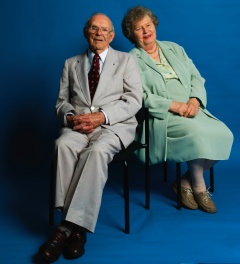Next: Affinity for Africa
Posted Jan. 12/08

- Long-time donors William Barton and Ruth Bell have each established a Chair in the Faculty of Public Affairs. (Photo: Luther Caverly)
Two long-time Carleton donors recently made gifts to the Faculty of Public Affairs that enabled the establishment of Chairs in the Norman Paterson School of International Affairs and the Department of Political Science. Created for teaching, research and public education, the William and Jeanie Barton Chair in International Affairs and the Honourable Dick and Ruth Bell Chair for the Study of Canadian Parliamentary Democracy capture the essence of the donors’ passion for education and their commitment to improving society.
William Barton’s distinguished 30-year career as a Canadian diplomat saw him hold positions as diverse as Canada’s ambassador to the United Nations, president of the UN Security Council, and Canadian representative on the Conference of the Committee on Disarmament (CCD). The CCD, which later became known as The Barton Group, was a major clearing house for issues and views on disarmament among Western countries.
“I retired in 1980, but continued my involvement in international affairs as a consultant,” says Barton. In his consultancy role, Barton drew on his experience as a diplomat on the world stage and helped establish the Canadian Institute for International Peace and Security, for which he served as chairman from 1984 to 1989.
“I guess you never really retire when you’re passionate about something,” says Barton, who received the Order of Canada in 1994 for his diplomatic role in enhancing Canada’s position and stature internationally.
With the establishment of the William and Jeanie Barton Chair in International Affairs, it is clear that Barton still hasn’t retired from working to improve the state of the world’s politics.
“I think Carleton does a very good job at addressing the areas of international affairs, but more can always be done,” he says. “I thought my donation to establish this Chair would help future generations of NPSIA students succeed on the international stage.”
“A young student going through international affairs education should have an open mind, but also a critical mind,” Barton advises. “You have to be able to express your thoughts well and be prepared to stand up for them, but when your boss says that’s it, you have to accept it and move on. That’s life in the public service.”
For Ruth Bell, MA/65, LLD/84, the focus is closer to home. An ardent supporter of many causes, Bell was one of the initial members of the National Action Committee on the Status of Women, and was a founder of both the Canadian Commission for Learning Opportunities for Women and the Canadian Research Institute for the Advancement of Women. In recognition of her tireless efforts for the advancement of women’s rights, Bell received the Governor General’s Person Award and, more recently, the Award for Lifetime Achievement from the YMCA-YWCA Women of Distinction. She also received the Order of Canada in 1981.
In the area of education, Bell—who pursued her first degree through five universities, three countries, two continents and 10 years—enjoyed an illustrious career as a professor at Carleton University. “When I was teaching I felt that students weren’t learning as much about Canadian government, politics or history as they should be,” says Bell. “I think people need to know about their own country—it is essential to being a good citizen. It is something my late husband Dick and I often talked about.”
“Dick was one of the most distinguished men we ever had in parliament—a very well informed man, not only a politician, but a lawyer of great distinction, too. He was always interested in the education of young people and that they learn about Canadian government,” says Bell. “I wanted to establish the Honourable Dick and Ruth Bell Chair to honour my husband’s distinguished career, a career that should be remembered.”
Bell also hopes that the Chair will develop plans and programs for exploring and extending the knowledge of Canadians on our history, government and political system. “Without knowledge of our own history, we might not appreciate the strides we have made and realize how good we have it today,” she says.
“What better place to have a Chair in this subject than the nation’s capital? It will help to attract, not only students, but academics, politicians and journalists as well.”